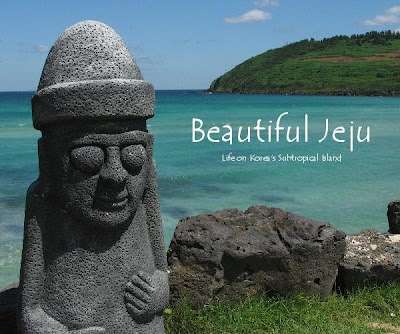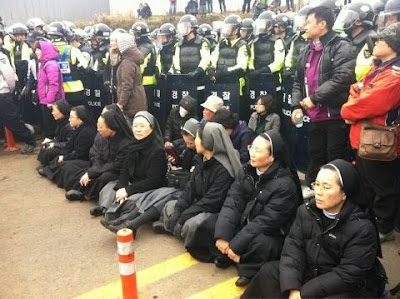 (Above: Tourism industry promotion of Jeju Island)
(Above: Tourism industry promotion of Jeju Island) South Korean authorities have moved against the people of Jeju Island to begin blasting the precious Gureombi coastline to make way for a naval base to serve the US imperialists. The first round of detonations began on the morning of March 7 2012 in Gangjung (also known as Kangjung), a village on the southern coast of Jeju
The blasting was to have begun on November 18 last year, but permission was refused by the island’s Governor Woo after local residents gained international support for a campaign to stop the blasting and the base.
On this occasion, Governor Woo has also denied permission for the blasting, but this has been ignored by the authorities.
Background
Jeju Island lies just off the southern-most tip of the Korean peninsula. It lies in pristine waters containing beautiful coral reefs and is an iconic and beautiful setting for peaceful traditional industries and tourism. It was recently voted one of the New Seven Wonders of the World and has a World Heritage Listing.
Jeju Island lies just off the southern-most tip of the Korean peninsula. It lies in pristine waters containing beautiful coral reefs and is an iconic and beautiful setting for peaceful traditional industries and tourism. It was recently voted one of the New Seven Wonders of the World and has a World Heritage Listing.
For several years, its people have been waging a mass struggle against the building of a naval base, to be used by both the South Korean and US navies.
The interests of the US imperialists lie in the strategic positioning of the island which oversees the shipping lane used by China for 80% of the oil it imports by ocean tankers.
They have a long history of resistance to occupation by, amongst others, China’s Yuan Dynasty, the Japanese militarists and US imperialism. In 1948 more than 80,000 islanders were massacred by the Syngman Rhee fascist clique following their usurpation of power and decision to divide Korea.
In deciding to oppose the naval base, the Jeju island residents point to the apology they were given five years ago by South Korea for the 1948 massacre. At the time, the government declared Jeju an “Island of Peace”, hardly compatible with the forced imposition of a naval base to serve the interests of US imperialism.
For the past four years, the Jeju people have maintained a protest site at Jangjeong Village adjacent to the proposed naval base.
On May 19 2011 the police and the military attacked the protest site and arrested eight of its leaders. However, the residents protected their site and its banners.
Then, at the crack of dawn on Friday 15 July undercover police arrested three more leaders of the resistance and declared that 76 others were banned from public waters or land near the Joongduk coastline where the base will be constructed.
Gangjeong Village Chief Kang Dong-Kyun, one of those arrested in the dawn raid, was fined $5,000 for each violation of an order requiring the removal of all facilities from the protest site.
US imperialism’s aggressive posturing against China
US imperialism is a declining economic power but is still the world’s No. 1 superpower. That is a dangerous mix.
US imperialism wants to threaten and intimidate China.
This is how a Stratfor analysis presented the matter a couple of days ago:
China also faces a primarily military problem. China depends on the high seas to survive. The configuration of the South China Sea and the East China Sea render China relatively easy to blockade. The East China Sea is enclosed on a line from Korea to Japan to Taiwan, with a string of islands between Japan and Taiwan. The South China Sea is even more enclosed on a line from Taiwan to the Philippines, and from Indonesia to Singapore. Beijing's single greatest strategic concern is that the United States would impose a blockade on China, not by positioning its 7th Fleet inside the two island barriers but outside them. From there, the United States could compel China to send its naval forces far away from the mainland to force an opening -- and encounter U.S. warships -- and still be able to close off China's exits.
(George Friedman, Assessing China’s Strategy, March 6, 2012)

(Above, elderly resident vociferously opposes the blasts and the base. Below, a group of Jeju Island grandmothers join the protest)

Build respect and understanding, not US bases
The blasting of Gureombi is an act of great environmental vandalism and fails to respect the wishes of the people of Jeju Island. At the present time, US imperialism is working through loyal allies in the region, including, regrettably, the government of my country Australia, to build up its military presence in the Pacific region. This is unwelcome and destabilises our region.
We want to see friendly relations based on mutual respect and understanding in our region, not increased military tensions based on vainly trying to maintain the privileges and power of the declining United States. The US risked nuclear war during the Cuban Missile Crisis. They would not like it if the Chinese Navy built a base in Cuba either. So why do they think the Korean and Chinese peoples want them to build a base for US Navy Aegis missile destroyers and aircraft carriers on Jeju Island?
We want to see respect for our global environment and particularly for the treasured coastline of Gureombi.
 (Above: nuns blockade the road to be used by contractors employed to carry out the blasting)
(Above: nuns blockade the road to be used by contractors employed to carry out the blasting)
 (Above and below, heroic residents defend th coastline against the police)
(Above and below, heroic residents defend th coastline against the police)

“Free trade” backed by gunboat diplomacy
The Korean people are also incensed that their economic interests are being taken away in the name of “free trade”. As the online Korea Times (a pro-government and pro-US publication) wrote on March 8:
“It is regrettable to see the nation sharply divided over the plan (for the naval base on Jeju Island). The controversy is among hot-button campaign issues such as the Korea-U.S. free trade agreement (FTA). The main opposition Democratic United Party (DUP) has already threatened to revise or nullify the trade deal if it takes power.”
 (Above and below: police deployed against the people)
(Above and below: police deployed against the people)
We want to see respect for our global environment and particularly for the treasured coastline of Gureombi.
 (Above: nuns blockade the road to be used by contractors employed to carry out the blasting)
(Above: nuns blockade the road to be used by contractors employed to carry out the blasting) (Above and below, heroic residents defend th coastline against the police)
(Above and below, heroic residents defend th coastline against the police)
“Free trade” backed by gunboat diplomacy
The Korean people are also incensed that their economic interests are being taken away in the name of “free trade”. As the online Korea Times (a pro-government and pro-US publication) wrote on March 8:
“It is regrettable to see the nation sharply divided over the plan (for the naval base on Jeju Island). The controversy is among hot-button campaign issues such as the Korea-U.S. free trade agreement (FTA). The main opposition Democratic United Party (DUP) has already threatened to revise or nullify the trade deal if it takes power.”
 (Above and below: police deployed against the people)
(Above and below: police deployed against the people)




No comments:
Post a Comment